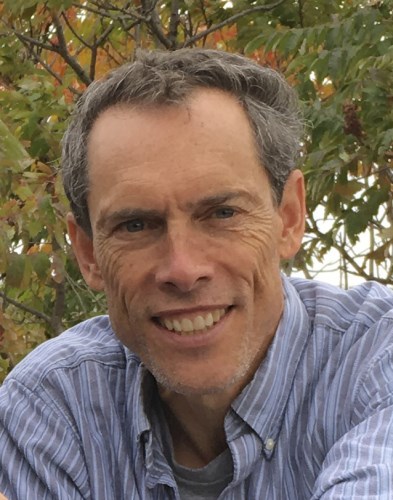
Source: https://www.legacy.com/ca/obituaries/thespec/name/thomas-hurd-obituary?pid=201923993
In Memory of Thomas Hurd (1956-2022)
Tom Hurd, professor in the Department of Mathematics and Statistics at McMaster University and world leading researcher in financial mathematics, died on April 28, 2022, at St Peter’s Hospital, Hamilton ON, five weeks after being diagnosed with brain cancer.
The son of physicists Ann and Allan Hurd, Tom was the only one of four siblings to follow in his parents footsteps, first with a bachelor’s degree in Mathematics and Physics at Queen’s University in 1978, followed by a doctorate in Mathematics at Oxford in 1982, where he was a member of Roger Penrose’s research group in General Relativity, supervised initially by Florence Tsou and subsequently by Lane Hughston. While in Oxford, Tom was a regular contributor to the legendary Twistor Newsletter, the informal journal published by the group. Decades later, he would proudly exhibit these early articles, written and illustrated by hand, as was the custom of the journal. His first peer-reviewed published papers also date back from this period, and were related to applications of conformal geometry to relativistic quantum field theory, the topic of his thesis.
After completing his doctorate, Tom stayed in Oxford for two more years as the Weir Junior Research Fellow, before accepting a postdoctoral fellowship in Mathematics at the University of British Columbia. This was followed by an assistant professorship in the same department. There he worked with Joel Feldman and others on constructive quantum field theory, with contributions exemplified in the wonderfully titled book QED: A Proof of Renormalizability.
Tom then moved to McMaster in 1989, where he started a fruitful collaboration with Jonathan Dimock from the University of Buffalo. This culminated in the powerful Brydges-Yau-Dimock-Hurd constructive method in quantum field theory. He was promoted to full professor at McMaster in 1996 where he stayed for the remainder of his career, which also included visiting professorships at Institut des Hautes Études Scientifique, École Polytechnique, the University of São Paulo, King’s College London, the Instituto Nacional de Matemática Pura e Aplicada, and the University of Aarhus.
From the early 2000s onward, his research focus became mathematical finance, where he made significant contributions to optimal portfolio theory, interest rate modelling, Lévy processes, indifference pricing, credit risk modelling, and computational methods, including a highly cited paper on cubature Kalman filtering co-authored with Simon Haykin.
His most recent interests were in the general area of systemic risk, with an emphasis on network models. His contributions are summarized in the short but influential book Contagion! Systemic Risk in Financial Networks, of which he was particularly proud. When the COVID-19 pandemic started, he was quick to realize that the modelling approach he had developed to analyze the spread of defaults in banking networks was also perfectly suited to the rigorous analysis of the spread of infectious diseases, and he became a key contributor to the Mathematics for Public Health initiative at the Fields Institute in Toronto. His most recent published paper, which was accepted for publication days after the cancer diagnosis was confirmed, presents a proof-of-concept analysis of business closures during the pandemic using data from Google Places, and perfectly illustrates his versatility and breadth of interests.
Tom was a dedicated mentor of young researchers, having supervised and co-supervised over 20 research-based graduate students and 15 postdoctoral fellows, many with successful academic careers launched in no small part because of his guidance and support. In addition, hundreds of students graduated from the professional Masters in Financial Mathematics that he created and directed for many years at McMaster, ensuring that his legacy is now well embedded in the financial industry in Canada and beyond.
He also served the scientific community in an exemplary fashion, having been a lead organizer of the World Congress of the Bachelier Finance Society in Toronto in 2010, as well as an organizer of numerous other workshops and conferences at the Fields Institute and the Banff International Research Station. For many years he was in charge of organizing the Quantitative Finance Seminars at Fields, and his grace and warmth while hosting the guest speakers made the experience memorable for everyone involved.
Tom began exhibiting signs of behavioural changes in early March 2022, while he was still teaching a full load of courses and conducting research in multiple projects. He went on medical leave after preliminary tests indicated a brain tumor, which was later confirmed to be grade 4 glioblastoma (GBM), an extremely aggressive and untreatable form of cancer. His condition deteriorated rapidly in the intervening weeks, leaving family and close friends in shock and disbelief.
As a final act of generosity, his family decided to make a donation of his brain tissue to the Sheila Singh Lab at McMaster University, a premier research facility expanding the frontiers of brain cancer research. It is heartening to know that, in addition to the long-lasting effects of his own research and teaching, Tom’s gift will allow vast amounts of unprecedented data on GBM to be collected and analyzed, potentially leading to insights into new therapeutic options for future patients.
Tom is survived by his wife Rita, daughter Emilia, son-in-law Kevin, and newborn grandson Linden. A celebration of his work and life will be held at McMaster University at a later date.
Tributes and memories can be offered through the funeral home web site here: https://www.circleoflifecbc.com/obituaries/Thomas-Hurd-2/
In lieu of flowers, please consider a donation to the Brain Tumour Foundation of Canada.
Matheus Grasselli


Leave A Comment
You must be logged in to post a comment.